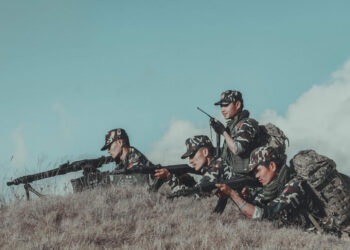This week marks six years since a 1994 bilateral ceasefire broke down and fighting renewed between the Burma Army and the Kachin Independence Army (KIA). Thousands of ethnic Kachin remain displaced, living in poor conditions in camps with no idea when they will be able to return home. Burma’s peace process may be ongoing, but fighting has persisted in Kachin State where Burma Army soldiers have been accused of human rights abuses.
The KIA recently joined armed groups in Northern Burma—the United Wa State Army, the Ta’ang National Liberation Army, the Myanmar Democratic Alliance Army, the National Democratic Alliance Army, the Arakan Army, and the Shan State Army-North—in denouncing the government’s nationwide ceasefire agreement (NCA).
To mark the anniversary of renewed hostilities, The Irrawaddy spoke to Lamai Gum Ja, a representative of the KIA’s political wing, the Kachin Independence Organization, which has been advising on negotiating peace between the armed group and the Tatmadaw.
What is your opinion on the current peace process? Is peace getting closer or further away?
It is very difficult for us to predict—this is our situation. The United Nationalities Federal Council (UNFC) is negotiating for groups to sign the NCA. This is one way [to approach the peace process].
There has been a lot of fighting on the ground, and we and other ethnic armed groups saw that the Burma Army launched military offensives to put political pressure on groups to sign the NCA. Because of this, the Northern Alliance seeks another way to stop offensives from the Burma Army. This is my point of view.
All our ethnic armed groups seek peace, and do not want to use fighting to solve political conflict. It is hard to predict how the government will react to this new alliance of northern ethnic armed groups.
Conflict between the Burma Army and the KIA renewed in 2011, what were your thoughts when the ceasefire first broke down?
To begin with, we believed that we could solve this conflict through negotiations. But, the situation got worse year by year. So, we began along the NCA path, which we believed could let us negotiate for peace. But, our belief was not realized as fighting broke out again in KIA areas.
The KIA and the Northern Alliance seek a new way to make peace negotiations. We will try to negotiate to solve the conflict peacefully. We do not use fighting to solve the conflict. But, the Burma Army only accepts the NCA, and it seems to me that they do not accept the Northern Alliance’s new way of approaching peace.
If we look at the current conditions, it seems to me we could have high tension again, especially as both the government and the Tatmadaw are important entities in the peace process…it depends on how they will accept the Northern Alliance’s new approach. They are the ‘parents’ of the country—they should have an open mind in order to find the best way to peace.
What is your message to internally displaced civilians who are exhausted from living in camps for such a long time?
Both the government and the ethnic armed groups should take pity on civilians and negotiate the best they can for them. Without negotiations, our civilians have no guaranteed safety in their work or daily life: they will live with fear and eat with fear. So, the best thing is for both sides is to find a solution that truly benefits civilians.

















